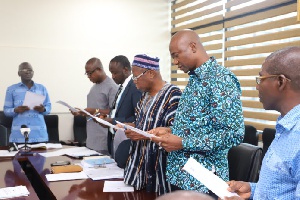 The nine-member Audit Committee of the Petroleum Commission being sworn into office
The nine-member Audit Committee of the Petroleum Commission being sworn into office
In a move to ensure effective corporate governance through efficient internal control mechanisms and risk assessment frameworks, a newly constituted nine-member committee has been inaugurated to steer the auditing affairs of Ghana’s upstream petroleum regulator, the Petroleum Commission.
The committee, chaired by Yaw Nimo Baffour – a representative of the Institute of Chartered Accountants Ghana (ICAG) and director of finance at KNUST – will work together with the internal audit department and other co-opted members of the Petroleum Commission in assessing the accounts, reviewing records and suggesting efficient ways of operating to enhance productivity while reducing wastage in the system.
Speaking at the nine-member committee’s inauguration, Director General at the Internal Audit Agency (IAA) Ransford Agyei tasked the members to lead, direct and ensure that the Petroleum Commission has a well-structured risk management operating procedure by establishing a corporate risk register.
“You should have a Risk Officer with other coordinators. First, open what we call the Risk Register to document all the risks that face you at the divisional levels, and analyse them as to the impact and whether it is likely to happen or occur,” he said.
“When that is done, you have to open a Petroleum Commission Risk Register wherein you estimate all the risks that have been identified to that level and try as much as possible to generate solutions to first prevent those risks from crystalising,” he advised.
The committee is made up of members including Usman Abdul Razak and Isaac Amartey, both representatives from the IAA; Mohammed Hardi Tufeiru (from the PC Board), and Mahami Salifu.
The rest are Egbert Faibille Jnr. (CEO of the PC); Prince Benjamin Aboagye (Deputy CEO, PC); Vincent Yankey (Director of Finance, PC); and Richard Hanson Anane, who are all co-opted members.
The committee’s Chairman, Yaw Nimo Baffour, expressed gratitude for the confidence reposed in him and his committee members, and pledged to carry out their role diligently in accordance with the constitutional requirements and responsibilities bestowed upon them.
“I would like to express our heartfelt gratitude to first of all our various institutions which nominated us to serve on this august committee, and also to thank the board of PC for accepting our nominations to serve on this audit committee,” he said.
“I assure you on behalf of our colleagues we are here to augment the good works that you have begun in the area of good corporate governance, and also the good internal controls and systems you put in place.”
Chief Executive of the Petroleum Commission and also a member of the committee, Egbert Faibille, said together with the PC board he is committed to ensuring that reviews, inspections and assessments – having expanded the audit unit into a department – are undertaken.
“When we took over administration of the Commission, there was only a one-man unit handling internal auditing; but with the good sense of corporate governance structures, the board approved expansion of that unit into a department to help make their work more efficient,” he revealed.
“Our books and our doors are always open because petroleum is a matter of public interest, and as stewards acting on behalf of the people of Ghana with respect to the upstream side of the petroleum value chain, we have no other option than to open ourselves up for further public scrutiny,” he concluded.